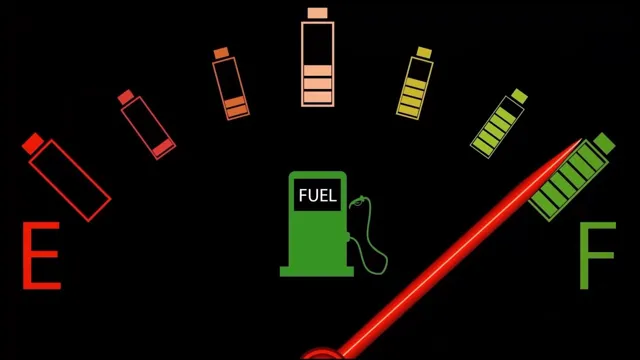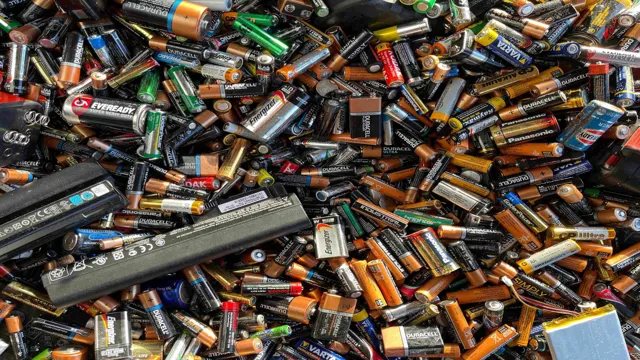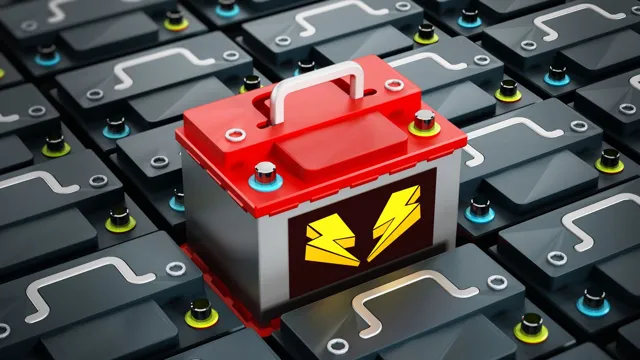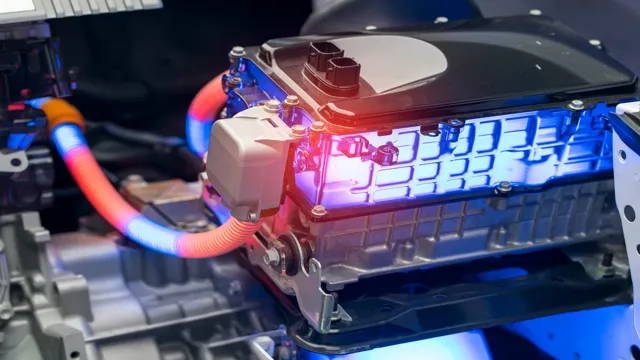Unlocking the Sustainability of Electric Cars: Understanding the Recyclability of the New Electric Car Batteries
Electric cars are becoming more and more popular as people embrace sustainable modes of transportation. These cars are powered by rechargeable batteries that have a finite lifespan. Eventually, the batteries will need to be replaced.
But what happens to the old batteries? This is where the issue of recycling electric car batteries comes in. While electric car batteries can be recycled, there are still a few challenges that need to be addressed. In this blog post, we’ll delve into the facts about the recycling of electric car batteries, exploring the benefits and challenges faced by the industry.
So buckle up and let’s dive in!
Recycling Electric Car Batteries
Yes, the new electric car batteries are recyclable. They have many valuable materials that can be separated and reused again. These batteries are made up of several components, including lithium, nickel, and cobalt.
Car manufacturers have been working tirelessly on improving the recyclability of electric car batteries to make them as sustainable as possible. While recycling technology is still evolving, many companies are now developing recycling methods to recover valuable materials from used car batteries. This process not only reduces environment damage by keeping hazardous substances from landfills but also helps to save materials that can be used to make new batteries.
As more manufacturers adopt sustainable production methods, it is imperative to ensure that electric car batteries are disposed of in an environmentally friendly manner, and recycling undoubtedly provides the answer. So the next time you think of changing your electric car battery, know that it can be recycled and reused again.
Lithium-ion Batteries Can Be Recycled
Electric car batteries, Lithium-ion batteries, Battery Recycling If you’re worried about the impact that electric car batteries have on the environment, you’ll be glad to know that lithium-ion batteries can be recycled. This means that instead of being dumped in a landfill, batteries can be broken down and reused, helping to reduce waste and minimize the environmental impact of electric vehicles. Not only does recycling batteries benefit the planet, but it can also be cost-effective for manufacturers.
By reclaiming materials from old batteries, manufacturers can save money on sourcing new materials and manufacturing new batteries. As a result, it’s becoming increasingly common for car manufacturers to offer recycling programs for electric car batteries. So if you’re considering an electric vehicle, you can do your part to protect the environment by choosing a car with a manufacturer that offers battery recycling.

Recycling Process of Lithium-ion Batteries
Recycling Lithium-ion Batteries Electric car batteries, also known as lithium-ion batteries, are an essential component of electric vehicles. However, these batteries have a limited lifespan, requiring them to be replaced every few years. Rather than disposing of these batteries in landfills, recycling is the most environmentally friendly option.
Recycling lithium-ion batteries involves several steps, including dismantling, sorting, and extracting valuable metals. These metals, such as cobalt, nickel, and lithium, can then be reused in the manufacturing of new batteries. The recycling process begins by dismantling the battery pack.
The pack is first discharged to make it safe to handle. The cells are then separated by applying mechanical stress to the pack. The next step involves sorting the cells based on their chemistry and size.
Once sorted, the battery cells are crushed, and the resulting powder is treated with chemicals to remove the organic binders and other contaminants. The extracted metallic powder can be used for the production of new batteries, reducing the need for mining raw materials. This not only conserves natural resources but also reduces the environmental impact of mining.
Additionally, recycling metals from lithium-ion batteries ensures that they do not end up polluting the environment, as these metals can be toxic if not disposed of correctly. In conclusion, recycling lithium-ion batteries is crucial for reducing the environmental impact of electric cars. This process allows valuable metals to be extracted and reused in new batteries while keeping toxic substances out of the environment.
By recycling these batteries, we can move towards a more sustainable future.
Environmental Benefits
Electric car batteries are becoming increasingly popular due to their environmentally friendly nature. As more people switch to electric cars, questions surrounding the recyclability of their batteries have arisen. The good news is that the vast majority of electric car batteries can be recycled.
In fact, more than 90% of the materials in a typical lithium-ion battery can be recovered and reused. This includes valuable materials like cobalt, nickel, and lithium – all of which can be used to manufacture new batteries or other products. Recycling electric car batteries not only reduces the amount of waste going to landfills but also conserves natural resources and reduces greenhouse gas emissions.
Companies like Tesla have even developed closed-loop recycling programs to further reduce waste and greenhouse gas emissions, making electric cars a sustainable and environmentally responsible choice. So, in short, yes, the new electric car batteries are recyclable, and recycling them has countless environmental benefits.
Reduction of Waste
Reduction of waste is a crucial part of creating a more sustainable future for our planet. By reducing the amount of waste we produce, we can help minimize the negative impact we have on the environment and protect natural resources. There are several environmental benefits to reducing waste, including the reduction of greenhouse gas emissions, conservation of natural resources, and a decrease in the amount of pollution that ends up in our air, water, and soil.
One of the biggest benefits of reducing waste is its impact on greenhouse gas emissions. Landfills are a major source of methane gas, a potent greenhouse gas that contributes to climate change. By reducing the amount of waste we send to landfills, we can significantly decrease the amount of methane that is released into the atmosphere.
Another environmental benefit of waste reduction is the conservation of natural resources. When we reduce the amount of waste we produce, we also reduce the amount of natural resources that are required to produce, transport, and dispose of that waste. This includes resources such as water, energy, and raw materials like timber and metal.
Finally, reducing waste can also help minimize pollution. When waste is not properly disposed of, it can end up in our air, water, and soil, leading to pollution and negative health outcomes. By reducing waste, we can prevent pollution and help protect the health of both humans and wildlife.
In conclusion, reducing waste is a crucial step towards creating a more sustainable future. By doing so, we can significantly decrease greenhouse gas emissions, conserve natural resources, and minimize pollution. It’s up to each of us to do our part in reducing waste by reducing, reusing, and recycling.
Let’s work together to ensure a cleaner, healthier planet for future generations.
Decreased Dependency on Raw Materials
Decreased Dependency on Raw Materials is an essential aspect of environmental benefits. Our planet has an abundance of raw materials such as metals, minerals, and fossil fuels, but excessive use of these resources can cause severe harm to the environment. The extraction and use of raw materials often lead to air and water pollution, destruction of natural habitats, and increased greenhouse gas emissions.
Decreased dependency on raw materials means utilizing renewable resources such as solar energy, wind power, and hydroelectricity, which reduce pollution, emissions and have a minimal negative impact on the environment. Adopting this approach will not only help in preserving natural resources for the future generation, but we’ll also reduce our carbon footprint and help halt climate change. Recycling, reusing and repurposing of raw materials in industries, and encouraging people to opt for sustainable products are ways to decrease dependency on raw materials.
This brings immense benefits such as cleaner air and water, a healthier earth, and a better future for generations to come. We all have a crucial role to play in protecting the environment by adopting a sustainable lifestyle. We can all start by reducing our consumption of single-use products, using eco-friendly alternatives, and supporting companies that prioritize sustainability in their operations.
Embracing sustainable practices and shifting our mindset towards conservation and preservation will go a long way towards creating a cleaner, healthier, and safer world for ourselves and future generations.
Reduction in Emissions
Reduction in emissions can have significant environmental benefits. When we emit less carbon dioxide and other harmful pollutants into the atmosphere, we help alleviate the negative impacts of climate change, including rising temperatures, more frequent and severe weather events, and decreased air quality. This can benefit not only human health but also ecosystems, wildlife, and biodiversity.
Moreover, reducing emissions can help slow down the depletion of natural resources, such as fossil fuels, and encourage the transition to cleaner and more sustainable energy sources, such as solar, wind, or hydroelectric power. By embracing cleaner and more efficient technologies, we can reduce our overall carbon footprint and contribute to a healthier and more resilient planet. It is our responsibility to take care of the environment and ensure that future generations have access to a clean and sustainable world to live in.
Future of Electric Car Batteries Recycling
Are the new electric car batteries recyclable? Absolutely! The automotive industry is leading the way in developing sustainable solutions for end-of-life electric vehicle batteries. Today, advanced recycling technologies are being introduced that can recover over 95% of a battery’s material composition, including precious metals like cobalt, nickel, and lithium. By recycling these materials, manufacturers can reduce their reliance on mining for new resources, helping to lower the industry’s environmental impact.
As more electric vehicles enter the market, recycling efforts are expected to grow rapidly, creating a robust circular economy that benefits both businesses and the planet. Overall, the future of electric car battery recycling is promising, and we can expect to see more innovative solutions in the years to come.
Research and Development for Better Recycling Techniques
As the popularity of electric cars continues to rise, so does the need for better and more efficient recycling techniques for their batteries. Currently, the recycling process for electric car batteries involves breaking down the battery into its individual components and then extracting valuable metals such as cobalt and lithium. However, researchers are constantly innovating new methods to maximize the recycling yield and reduce the environmental impact of the process.
One such method involves using electric currents to break down the battery into its constituent parts, while another technique involves using high-pressure water jets to separate the valuable metals. As research and development in this field continue to progress, we can expect to see more efficient and environmentally-friendly techniques emerge for the recycling of electric car batteries, ensuring a more sustainable and responsible approach to energy consumption.
Incentives for Battery Recycling Programs
The future of electric car battery recycling looks promising, and incentives for battery recycling programs are at the forefront of this movement. As we continue to shift towards electric vehicles, it’s becoming more important than ever to have a sustainable process for managing used batteries. Battery recycling programs can help reduce waste while recovering valuable materials like lithium, cobalt, and nickel.
Incentives like tax breaks, free disposal, and rebates can encourage both individuals and businesses to participate in these programs. Some companies are also exploring innovative recycling facilities that use cutting-edge technology to extract more materials from used batteries. Overall, the benefits of battery recycling are clear – reducing environmental impact, conserving resources, and saving money.
As more people become aware of these advantages, we can expect to see increased participation in battery recycling programs and a brighter future for sustainable transportation.
Conclusion
In conclusion, the question of whether the new electric car batteries are recyclable is a resounding “yes!” With a growing emphasis on sustainability and reducing our carbon footprint, the development of electric car technology has been a game-changer. Not only do these efficient vehicles lessen our dependence on fossil fuels, but the batteries themselves can be recycled to ensure that the impact on the environment is minimized. It’s clear that the future is electric, and we can feel good about driving towards it in more ways than one.
“
FAQs
How are the new electric car batteries different from traditional car batteries?
The new electric car batteries are made with more advanced technology, such as lithium-ion, which allows for longer ranges and quicker charging times. Additionally, they are designed to be more environmentally friendly, with the ability to be recycled.
Can electric car batteries be recycled?
Yes, electric car batteries can be recycled. The most common materials used in these batteries, such as lithium and cobalt, are valuable and can be reused in other applications. Recycling the batteries also prevents harmful chemicals from leaching into the environment.
How long do electric car batteries last?
The lifespan of electric car batteries can vary depending on a number of factors, such as usage patterns and environmental conditions. However, most manufacturers offer warranties ranging from 8 to 10 years, and some vehicles have been known to drive well beyond 200,000 miles on their original batteries.
How much does it cost to replace an electric car battery?
The cost to replace an electric car battery can vary depending on the make and model of the vehicle, as well as the type and size of the battery. In general, replacement batteries can range anywhere from $3,000 to $15,000 or more. However, some manufacturers offer battery leasing programs to help offset the cost.







